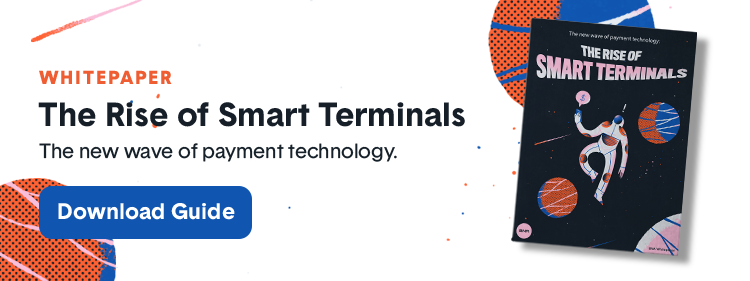Transaction freedom.
That’s what you get with a mobile point-of-sale (mPOS).
How many times have you wanted to sell your products on the road, at a festival, at a conference, or at a trade show? Maybe you’ve even thought of selling in aisles. Maybe you’ve always wanted a backup terminal, just in case your desktop terminal fails.
When selling in non-traditional locations in the past, you typically had to limit your payment types to cash and cheque . Alternatively, you could bring a very old-school zip zap machine to make imprints of credit cards (remember those?).
The mPOS has made it easier for you to sell and accept card payments on the go, from anywhere.
What is an mPOS?
An mPOS can either be a smartphone, tablet, or dedicate payment terminal that works as a cash register or POS system on the go.
All you need to use it on the road are:
- An internet connection since it’s wireless
- A credit and debit card reader
- An mPOS application like Converge downloaded to your phone or tablet
If needed, you can also connect an mPOS to a cash drawer or barcode scanner to really take your wireless transactions to the next level.
How does it work?
There are a couple different kinds of mobile point-of-sale solutions that work slightly differently.
Standalone terminal: You can get an mPOS terminal like the Ingenico Link 2500, which acts as a standalone device. It’s basically a mini credit card machine you can take on the road. It’s linked to your merchant account. With this solution, you’d also download an mPOS app to your phone or tablet. Then, every time you process a transaction on the standalone device, the transaction details are automatically submitted to the app for processing.
Smartphone card reader: You can also get a small card reader that plugs into your smartphone or tablet’s audio jack and connects to an app. Once connected, this card reader can process credit and debit cards.
With both solutions, cardholder data is encrypted and stored in the cloud, as opposed to on your device, so you can be sure your customers’ credit card details are always protected.
Is an mPOS right for my business?
If you sell your products exclusively online or in store, you’re not going to need an mPOS. But if you’re often on the go, selling products wherever you are, then an mPOS is an ideal option for accepting card payments.
It’s a great solution for:
- Contractors (plumbers, HVAC, etc.)
- Food trucks
- Festivals
- Sporting venues
- Exhibitors
- Trade shows
- Transportation
- Delivery services
- Flea markets
- Farmers’ markets
- Attended kiosks
- Mobile grooming or beauty businesses
Mobile point of sale solutions are versatile and portable, so you don’t have to be tethered to one location.
Basically, if you don’t sell in a permanent location, you should probably consider an mPOS to accept card payments. It’s a lot more convenient and cost effective for you to invest in a mobile solution than an expensive (and space-constraining) traditional POS.
Plus, your customers will appreciate having more payment options than cash and cheque. (Who carries those around anymore?) With the right mPOS solution, you’ll not only be able to reduce wait times, speed up service, and accept credit and debit payments, but you’ll also be able to accept contactless payments, so your customers can simply tap and go.
Over the last few years, mPOS solutions have grown in popularity thanks to the flexibility and portability they offer. Companies looking to sell in non-traditional locations and improve the payment experience during these transactions should consider an mPOS.



